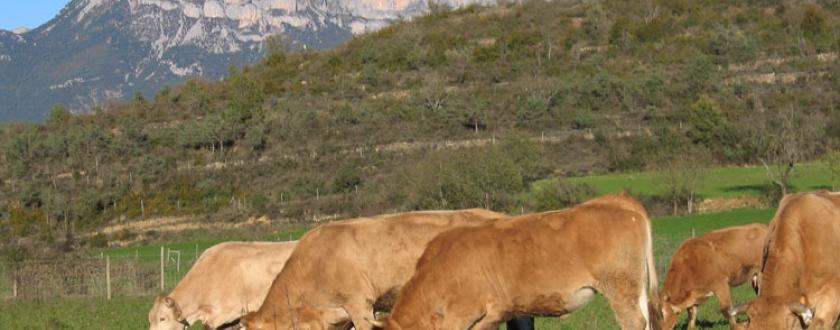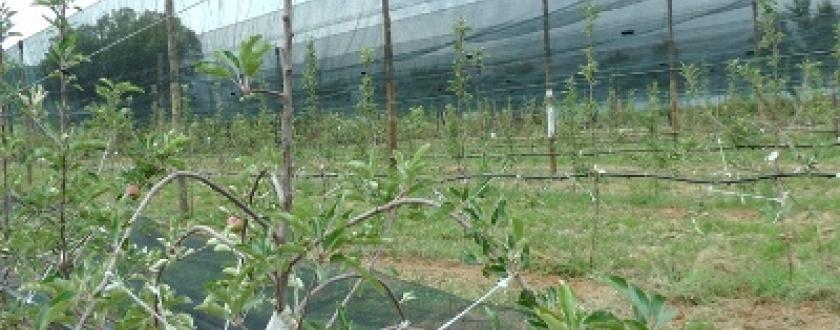Agroecology practices on Finca Fes, Aínsa, Huesca
Description of the case study
The Adapta Agroecología programme led by the Spanish Society of Organic Farming (SEAE) uses agroecological production and marketing practices to contribute to climate change adaptation in the agricultural sector. Finca Fes (Aínsa, Huesca) and its manager, the cattle farmer Luis Lascorz, are a good example of how the farming and livestock sector can be adapted to the effects of climate change via a strategy which promotes quality, resilience and organic production.
Organic agriculture and livestock farming are sustainability-based models for food production and management of the region and its natural resources. This approach is now an opportunity to make progress in adapting agriculture to the effects of climate change. It supports knowledge of and respect for natural ecological processes with a view to increasing the resilience of estates/farms. It also promotes management and usage practices for land and water which respect the natural environment, and encourages landowners to maintain agrobiodiversity on their land.
Practices to improve biodiversity enable farms to imitate natural ecological processes and to better respond to the consequences of climate change. In that regard, farmers should monitor their agroecosystems closely and work regularly with other farmers to share information and learn.
The overall objectives of the Adapta Agroecología programme are as follows:
- Promote joint processes for creating agroecology technology which involve researchers, advisers and producers and which strengthen the capacity of this last group to tackle the consequences of climate change and better adapt.
- Raise awareness among the different levels of society so that they adopt practices which facilitate climate change adaptation, such as consuming organic food.
The specific climate change adaptation objectives on Finca Fes are:
- Recovery and adapted use of autochthonous Pirenaica cattle.
- Implement agroecological measures to improve crop management and make better use of uncultivated pasture.
- Select an appropriate mix of seeds to develop pastures which are adapted to the characteristics of each environment and farm.
- Plant local varieties of apple to diversify production.
The solutions developed by Luis Lascorz on Finca Fes to adapt the farm to climate change are as follows:
- Farm with 100 head of Pirenaica cattle, a breed well-adapted to the climate and high pastures of Sobrarbe.
- Extensive rational grazing and fodder exclusively from estate via livestock management using electric fencing and own fertiliser.
- Direct ‘0 km’ sale of 60% of produce through the farm's own butcher's (showcasing and promoting their agroecology practices).
Case mainly developed and implemented via objectives from other non-adaptation policies, though with significant consideration for climate change adaptation aspects.
Spanish Society of Organic Farming, Luis Lascorz.
Additional Information
The Adapta Agroecología is led by the Spanish Society of Organic Farming in collaboration with 12 state-wide farms/estates which employ agroecology practices. The project has received funding from Fundación Biodiversidad, part of the Ministry for Ecological Transition.
Success: an organic farming community which is united and aware of the need to adapt to climate change; more resilient farms and farming techniques; farmers and livestock farmers are open to innovation; value added of organic produce facilitates quality management.
Limiting: fewer number of farms and hectares used for organic production in Spain, particularly in mountain livestock farming; end consumers have little knowledge of climate change adaptation practices beyond organic farming; low implementation of agri-environmental techniques on conventional farms.
The Adapta Agroecología project has been funded by Fundación Biodiversidad.
The Adapta Agroecología project has received financial support in the form of grants from Fundación Biodiversidad (part of the Ministry for Ecological Transition) for climate change adaptation projects (2017). Work to plant apple trees on Finca Fes has also been supported by the Sobrarbe Emprende programme, which has financial and technical support from the Aragonese Development Institute through its grant stream for promoting entrepreneurship in comarcas in Aragon.
In progress
Reference information
PYRENEAN CLIMATE CHANGE OBSERVATORY
Avenida Nuestra Señora de la Victoria, 8
22.700 - Jaca
Huesca - España
+34 974 36 31 00
info_opcc@ctp.org






